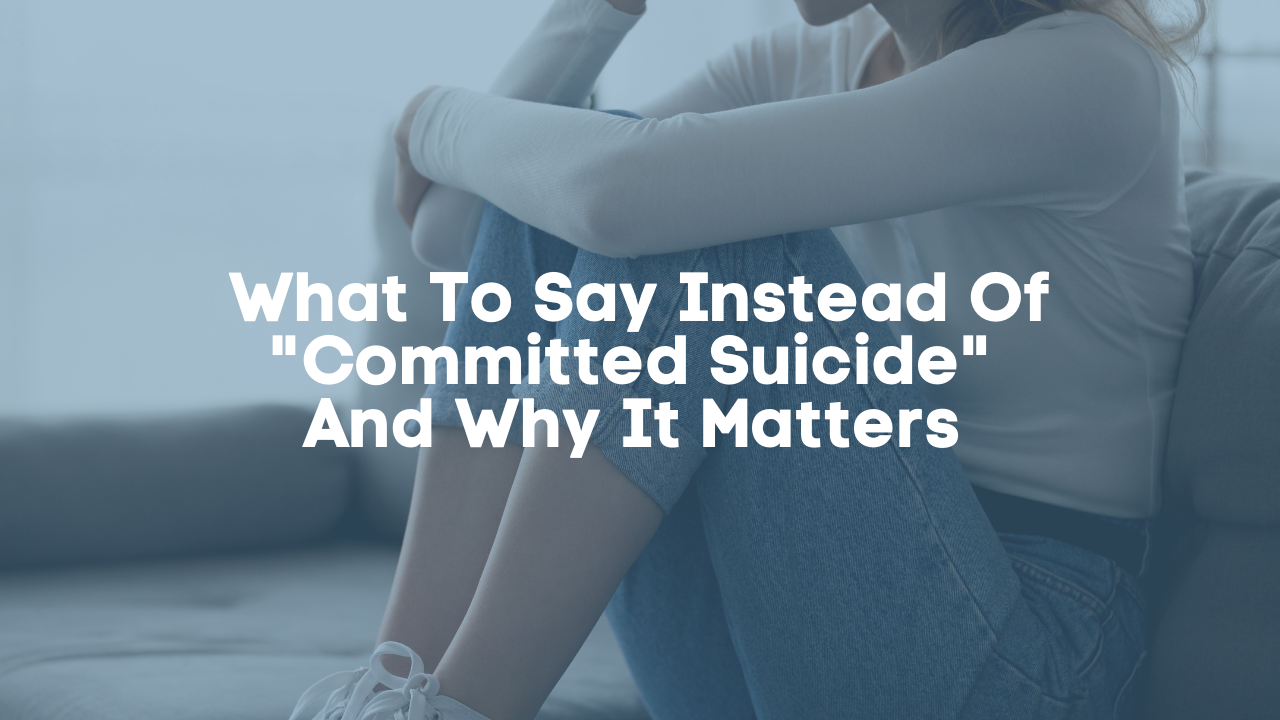What To Say Instead Of "Committed Suicide" And Why It Matters
Sep 21, 2025
Someone you care about has died by suicide. Maybe it was recent, maybe it was longago. And in the aftermath, conversations with family, through news reports, even your own internal dialogue, you've probably heard or said the phrase "committed suicide" because it’s what we’ve been taught.
Here's something that might surprise you: using the word “committed” carries a weight that most people don’t realize. And if you're supporting someone else through suicide grief, or navigating it yourself, the language we use matters more than we might think.
September is Suicide Prevention Awareness Month, so we want to talk about how the words we choose can either add to shame or help reduce it.
The Problem with "Committed"
When we say someone "committed” suicide, we're unconsciously linking their death to language we typically use for crimes or sins. Think about it, what else do we "commit"? Murder. Robbery. Adultery. Even positive actions like "committing to a relationship" carry almost ceremonial weight.
Using "committed" takes us back to outdated thinking that treats suicide as a moral failing rather than what it actually is: a death that happened, often in the context of mental illness.
As our friends at organizations like Talk Death Daily have pointed out, language shapes how we think about death and how we treat the people left behind.
What to Say Instead
"Died by suicide."
That's it. Simple, factual, and without judgment.
Just like we'd say someone "died from cancer" or "died in an accident," saying someone "died by suicide" focuses on the truth: a death happened, and this is how it happened. There's no moral weight attached, no implication of wrongdoing, no suggestion that the person made a calculated decision to hurt others.
Why This Matters for Grief\
Families dealing with suicide grief often carry enormous shame, wondering what they missed, what they could have done differently, how people will judge their loved one (and them). When we use language that reinforces the idea that suicide is something to be "committed" rather than a death that happened, we're adding to that shame.
When we say "died by suicide," we're treating their loss the same way we'd treat any other death – with dignity and without judgment.
For Those Supporting Suicide Grief
If someone in your life is grieving a suicide death, here are other ways language matters:
Avoid: "At least they're not in pain anymore" (implies their death was a reasonable solution)
Try: "I'm so sorry for your loss."
Avoid: "I can't believe they would do that to their family" (adds guilt and blame)
Try: "This must be incredibly difficult for your family."
Avoid: "There were so many signs" (implies the family should have prevented it)
Try: "I am so sorry you are going through this."
Avoid: "Everything happens for a reason" (there's no good reason for this kind of pain)
Try: "This really sucks, and I'm here."
It's Not About Being "PC"
This isn't about political correctness or walking on eggshells. It's about recognizing that suicide grief comes with unique stigma, shame, and complexity.
Language evolves, and so do we. Changing how we talk about suicide isn't about judging how we used to speak – it's about doing better as we learn more.
If you catch yourself saying "committed," just gently correct it. If you hear others use it, you can model the alternative without making it a whole thing: "Yes, she died by suicide."
The people grieving suicide deaths will notice. And in a world that often makes their grief feel different or wrong, using language that treats their loss with the same dignity as any other death? That's a small gift you can give them.
Resources for Suicide Prevention and Support:
-
National Suicide Prevention Lifeline: 988
-
Crisis Text Line: Text HOME to 741741
-
Talk Death Daily: For more resources on suicide grief and breaking stigma around death conversations
If you're supporting someone through suicide grief, we see you. It's complicated, it's heavy, and sometimes it feels impossible to know what to say. Starting with language that doesn't add shame? That's a good first step.
Remember: grief is grief. No matter how someone died, the people left behind deserve support, compassion, and language that doesn't make their pain heavier than it already is.
Join the Grieve Leave movement
Share your info to join our Grieve Leave community. You don’t want to miss anything!


